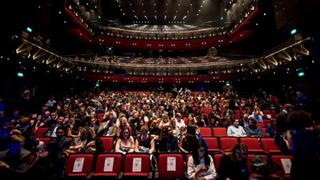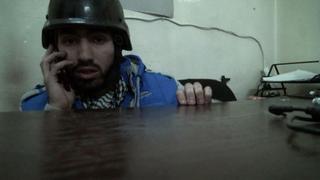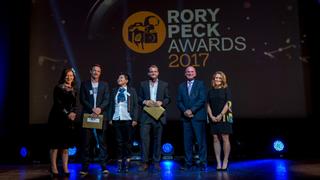Rory Peck Winners Battle for the Truth

The 2017 Rory Peck Awards were held in the Sadler’s Wells Theater in London.
LONDON—The annual Rory Peck Awards, which were held at the Sadler’s Wells Theater here Oct. 24, honor achievements in freelance still and video photography worldwide. The Rory Peck Trust helps freelancers behind the camera, some of whom work in the most dangerous environments in the world, with training, advice and financial support. The awards honor the superb work of the best of these, who are working at the front lines of news and documentary.
Not surprisingly, the entries for this year’s Rory Peck Awards—and its winners—were overwhelmingly dominated by reports on and from the Middle East, where covering a breaking story can be potentially fatal.
THE LONG GOODBYE
The winner of the Sony Impact Award for Current Affairs was a film commissioned by BBC Arabic, “Goodbye Aleppo.” The film was the result of a collaboration among four Syrian filmmakers from Aleppo who documented their last days in a city that had been their home, as Syrian government forces closed in. As with a number of Rory Peck nominees and winners—some of whom are literally in hiding—Siraj Al Deen Al Omar, Mojahed Abo Al Jood, Basim Ayyoubi and Ahmad Hashisho, were unable to attend the ceremony. However, BBC Arabic’s Christine Garabedian, the film’s producer-director, told TV Technology how the team collected footage under impossible circumstances.
“Technology allowed us to make this film,” said an emotional Garabedian. “The lines had been bombed. They had satellite dishes and they hacked through phone lines. We had to defy the war, not just to film it, but to even upload it. I didn’t know until they had finally left the country if we even had a film. We couldn’t upload while the war was raging, it was too dangerous. They would send us a few shots, but until the end of December 2016, we didn’t know if we had a film. And our biggest fear was, were they even alive?”

A scene from Goodbye Aleppo
Get the TV Tech Newsletter
The professional video industry's #1 source for news, trends and product and tech information. Sign up below.
During shooting, over 100 hours of footage was stored on hard drives. The filmmakers struggled to protect the footage while keeping themselves out of danger. Filmmaker Ahmad Hashisho was beaten and robbed of all his drives and computers.
“I thought we’d lost one quarter of all our footage,” said Garabedian. “We reconciled ourselves to that. Then two weeks later Ahmad called and said, ‘A friend of mine has discovered footage that I saved on one of his drives!’”
The team shot on whatever tools they had available, from a DJI Phantom drone to Canon DSLRs to mobile phones. Operating without a power grid, the filmmakers ran on generator power (with BBC Arabic paying for fuel) or wherever electricity could be quickly appropriated on the fly.
BBC Arabic was rigorous in verifying the authenticity and circumstances of each shot. The film was rigorously cut along a chronological timeline, faithfully recording the passage of time during the fall of Aleppo.
“We actually analyzed the metadata of every single shot in the film to make sure it was filmed on the day they said it was filmed,” Garabedian said. “And we verified it with our colleagues at BBC Arabic, many of whom are from East Aleppo or have family there. We would also verify the accuracy of events. If, say, there was an explosion that was shown on a certain day in a certain place, we connected with locals too to confirm it. The formidable contacts and knowledge we have at BBC Arabic really helped us.”
THE FIGHT IS ON
One of the finalists for the Sony Impact Award was “The Fight,” a film broadcast by The Guardian, made by Dan Fallshaw and Violeta Ayala. The film follows a group of disabled activists in Bolivia who crossed the Andes in 2016 to protest for their rights in the Bolivian capital La Paz. They were met by police barricades, tear gas and water cannons.
Native Bolivian filmmaker Ayala delivered a rousing runner-up speech reminding all present that filmmakers aren’t competitors, but are all in the same global fight for truth and universal justice. She and Falshaw shot primarily with the Canon 5D and Canon 7D. A Sony camera was stolen during the shoot (by people from the Bolivian government, Ayala speculates) and Ayala had to rely on her iPhone for some shots. The iPhone also provided coverage that went out to the media.

“The Fight,” a film broadcast by The Guardian was a finalist for the Rory Peck Awards. Second from left are Dan Fallshaw and Violeta Ayala.
The Canon cameras proved to be robust during the harsh shoot. “One of our cameras was hit by a water cannon,” says Ayala. “I was thinking ‘That’s it. It’s broken.’ It stopped working, but then the next day it was fine. I was surprised at how well they responded to these tough situations.”
The shoot began in March 2016 and was shown in May 2017, with an edit time of three months. Fallshaw and Ayala shot for 30 days on the journey to La Paz, and 90 days at the encampment. They plan to also make a feature film about the protest.
WORKING LIGHT
Ukranian filmmaker Mstyslav Chernov was a finalist for the Rory Peck Award for News for his coverage of Iraqi special forces as they moved into Mosul in November 2016. His images are breathtaking, and his camera is always at the center of the action.
For some time, Chernov’s camera of choice has been the Canon C300 Mark II, with a Canon 17-55 lens: “What I do is very observational, and the logistics are very difficult, so I only use the 17-55,” he said. “But because they’re fragile, I carry five identical lenses with me around my belt. If one is dirty or damaged, I can replace it. It’s a very versatile lense. I’m very impressed by it. I think it’s probably the best lense for that type of work.”
Chernov likes to keep it simple throughout his shooting.
“I don’t use a rig. It’s only handheld,” he said. “I don’t like to put the camera on my shoulder. And I remove the top handle to make the camera as compact as possible. As you can imagine, I never go outside without that camera, so I need something that is light.”
He uses a Rode NTG-3 top directional shotgun microphone. “I don’t mic people,” Chernov said. “I don’t have time in those environments. I have my hard drive and laptop with me and I backup my cards twice. So I have two times the footage and then I keep the cards with me.”
CHANGING NEEDS
Sony has been a principle sponsor of the Rory Peck Awards since their inception in 1995. Richard Scott, Head of Media Solutions at Sony Professional Solutions Europe said the company is very aware of the changing needs of freelancers working in some of the most challenging conditions imaginable.
“We continue to use our customer network to help us with the next series of developments and the roadmaps for products,” says Scott. “For field journalism like this, it’s all about lighter and smaller cameras, better battery life and more resilience to harsh conditions, and those things are an ongoing development.
“On top of that, we’re steadily improving image quality—all of our camcorders across the whole range have 4K capability and HDR. Most of those features were originally developed at the high end to create beautiful pictures. But for this end of the business, it’s about creating any kind of picture at, when there’s no light and you’re in very harsh conditions. We’re continuing to push the boundaries on the image sensor and processing, while trying to get the cost down as well.
“We’re very excited at what Tina Carr (director of the Rory Peck Trust) and the Trust have done this year. We’ve been associated with this for many years. To see it grow and become global is really impressive.”
Click here for full information on all the Rory Peck Awards finalists and winners.
